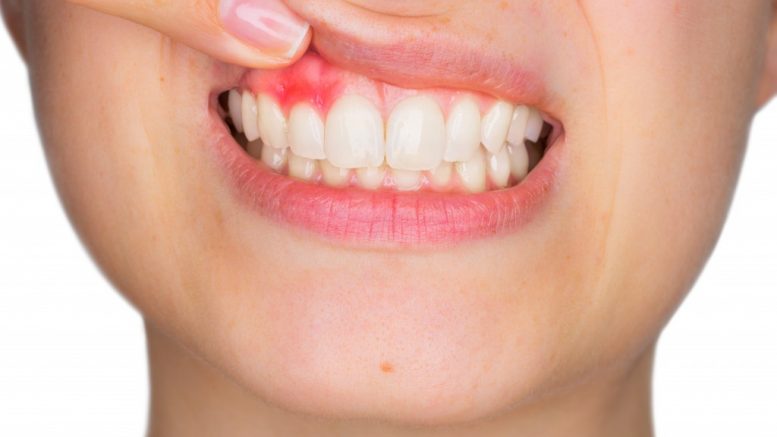To take a look in the mirror and realise your gums are visibly receding can be upsetting to say the least. Along with adding years to personal appearance, receding gums are also a sign of potential oral health problems in the making. The issue being that by the time receding gums become noticeable, the problem may already be relatively advanced.
As with all oral health symptoms, receding gums aren’t necessarily an indicator of something seriously wrong. But given the fact that they can be, it’s important to consult with your dentist should you have any concerns whatsoever.
The better you get to know gum recession, the stronger the position you’ll be in to stop tooth loss in its tracks.
What’s the Danger with Gum Recession?
What makes gum recession potentially harmful is the way in which physical gaps are created between the gum line and the teeth, exposing the root of the tooth. Over time, bacteria have a nasty habit of collecting in these gaps and crevices, which can be difficult to remove – even with the best electric toothbrush on the market. Should the problem become particularly severe, the surrounding bone and tissue structure can be damaged to such an extent that the tooth can become loose, or even fall out.
Once again, one of the biggest problems with gum recession is that it often goes undetected until the problem is relatively advanced. On the plus side, dentists can usually detect the early signs of gum recession with ease, helping prevent advanced problems before they are able to manifest.
What Causes Gum Recession?
Many cases of gum recession are caused by nothing more than the aging process. The older we get, the more likely our gums are to recede and therefore the greater the extent to which we need to care for our oral health.
Along with the aging process, gum recession is commonly caused by gum disease. Contrary to popular belief, the vast majority of adults will experience gum disease to one extent or another during their lifetime. Where gum disease is present, bacteria gradually eat away at the bone structure and gum tissue that hold the teeth in place. The result of which can be both gum recession and eventual tooth loss.
You are also significantly more likely to experience gum recession if your general oral health and hygiene regime is less than ideal. As far as dentists are concerned, paring a premium electric toothbrush with an approved water flosser and a good mouthwash adds up to the best everyday defence against both gum disease and gum recession.
Teeth grinding is another known cause of gum recession, as is smoking cigarettes and the use of various recreational drugs. In fact, our overall health and lifestyle habits are attributed to most aspects of our oral health in general.
Last but not least, some people are naturally predisposed to gum recession on a much higher level. As such, there isn’t always a specific explanation or identifiable cause for the problem. In all instances however, gum recession can ultimately lead to the same unfortunate consequences.
Can Oral Piercings Cause Gum Recession?
This is one of the most-hotly debated issues of all, splitting members of the public right down the middle. As far as the experts are concerned however, it’s a pretty cut-and-shut issue. Does every oral piercing increase the likelihood of gum recession? No. However, if you have oral jewellery that rubs against your teeth and gums in a manner that is unnatural, there’s every possibility you are increasing your risk of gum recession and oral health issues in general. Not every dentist advises strictly against oral piercings, but the vast majority advise approaching them with care and caution.
What Are the Available Treatment Options?
If you do find yourself dealing with a case of gum recession, there are various treatment options to explore. In cases where the problem is somewhat remedial and in its earliest stages, it’s unlikely that your dentist will recommend anything particularly invasive. Instead, deep cleaning and the provision of specialist products can help prevent the problem from getting any worse. In cases where gums have already receded somewhat excessively, surgical procedures like pocket depth reduction, regeneration or soft tissue grafts may be recommended. Nevertheless, suitability varies significantly from one patient to the next and not all cases can be treated in the same way.
How Can You Prevent Gum Recession?
As is the case with most things, preventing gum recession in the first place is far easier than attempting to treat the problem further down the line. The good news being that just as long as you are consistent, it is relatively easy to avoid gum recession long-term.
Once again, the single most important preventative measure is that of ensuring you keep your mouth in immaculate condition. Take your oral health and hygiene regime to extremes, using the highest quality products and devices on the market, used in accordance with the manufacturer’s instructions and the advice of your dentist. Speaking of which, you absolutely must visit your dentist on a regular basis, allowing for early indications of problems to be detected and addressed as required.
Try to avoid the kinds of lifestyle habits that have been linked with gum recession and poor oral health in general. If you smoke, try quitting. If you drink too much alcohol, try cutting down. If your everyday diet isn’t particularly fantastic…well, you can probably figure out the rest for yourself!
Last but not least, if you suspect that you are affected by teeth grinding – particularly if the problem happens overnight while you sleep – you may want to think about investing in a mouth-guard. These simple yet effective devices can protect your teeth and gums from the potential damage caused by bruxism, which is an extremely common cause of gum recession.
And once again, if you have any concerns whatsoever regarding your oral health, speak to your dentist at the earliest possible juncture.
